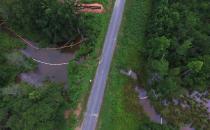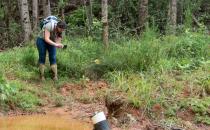Appeals court sides with citizens, SELC in petroleum pipeline pollution case
The United States Court of Appeals has ruled that local citizen groups can enforce the Clean Water Act to stop continuing pollution of the Savannah River watershed in Anderson County, S.C., from a gasoline pipeline spill by Kinder Morgan.
In a case brought by SELC, the Fourth Circuit U.S. Court of Appeals in Richmond ruled that Upstate Forever and the Savannah Riverkeeper can proceed in federal court in South Carolina to stop the continuing flow of gasoline and diesel fuel into a tributary of the Savannah River near Belton. In 2017, a U.S. District Court had dismissed the suit.
This decision is a win for clean water and a win for the Belton community in Anderson County,” said Senior Attorney Frank Holleman. “Local citizens can now ask the court to require Kinder Morgan to stop the petroleum pollution of Anderson County’s waters that flow from Belton to the Savannah River.
In December of 2014, local residents discovered that Kinder Morgan’s underground Plantation Pipe Line had ruptured, spilling hundreds of thousands of gallons of gasoline and diesel fuel. The fuel polluted a nearby Savannah River tributary immediately and, more than three years later, petroleum pollutants continue to flow into the waterway. Kinder Morgan had no legal authorization for this pollution.
The case now returns to U.S. District Court in South Carolina for enforcement of the Clean Water Act against Kinder Morgan’s pipeline pollution of the waterway.
Petroleum pipeline pollution threatens the Savannah River from the Atlantic Ocean up to Anderson County,” said Tonya Bonitatibus, the Savannah Riverkeeper. “We are enforcing the Clean Water Act to ensure that the Savannah River watershed is protected from gasoline and diesel fuel when pipelines break.


